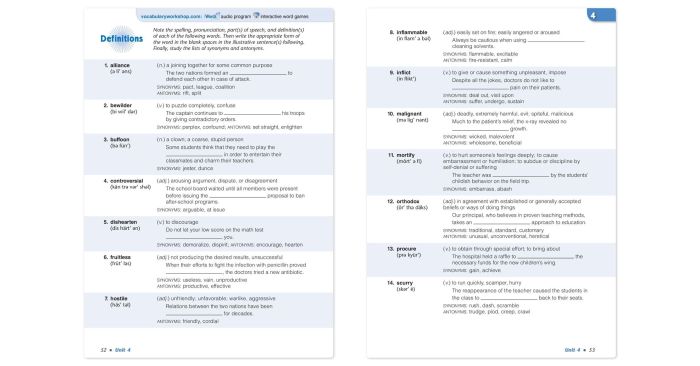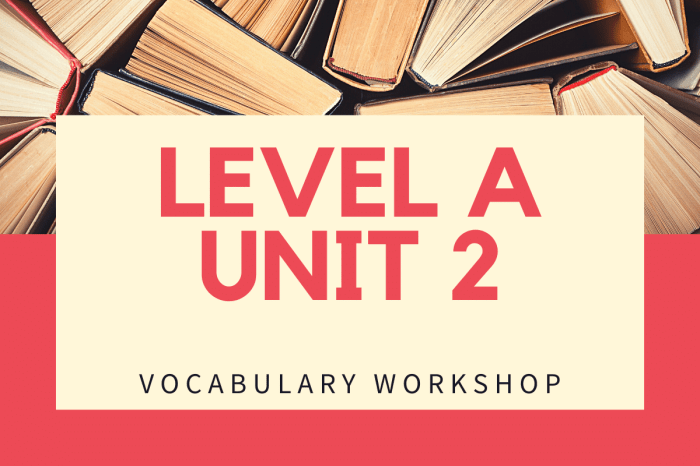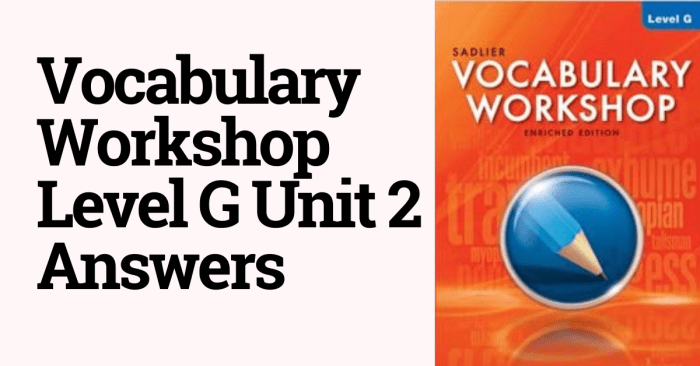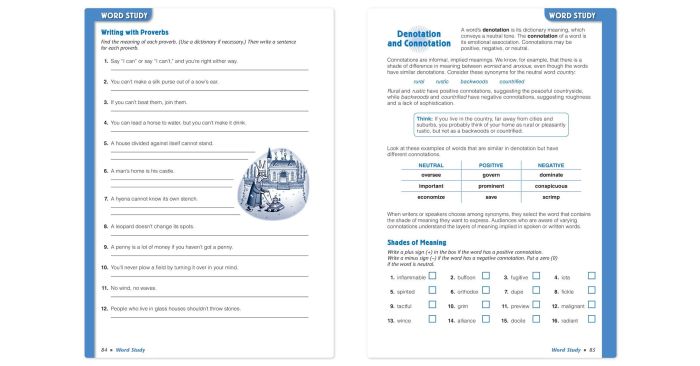Embark on a linguistic journey with vocabulary workshop level b unit 2 answers, an invaluable resource for expanding your vocabulary and refining your language skills. This comprehensive guide provides a roadmap to effective vocabulary acquisition, empowering you to navigate the nuances of word meanings and usage.
Delving into the intricacies of vocabulary development, this guide unveils the secrets of acquiring new words, understanding their multifaceted meanings, and employing them effectively in various contexts. Through engaging activities and insightful explanations, you will unlock the power of vocabulary and elevate your communication abilities.
Vocabulary Acquisition Strategies

Effective vocabulary acquisition involves employing strategic methods to enhance word knowledge and retention. Spaced repetition, exposure to context, and active engagement are crucial components of successful vocabulary development.
Spaced repetition:Reviewing new words at increasing intervals strengthens memory and improves long-term retention. Flashcards, spaced repetition software, and regular review sessions are effective techniques for spaced repetition.
Context:Encountering words in meaningful contexts aids in understanding their usage and nuances. Reading widely, engaging in discussions, and listening attentively to conversations provide ample opportunities for contextual exposure.
Active engagement:Engaging with new words through writing, speaking, and using them in daily communication promotes active learning and enhances retention. Activities such as writing sentences, creating mind maps, and participating in vocabulary games facilitate active engagement.
Word Meanings and Usage
Words carry various types of meanings, including denotative, connotative, and figurative. Understanding these distinctions is essential for accurate word usage.
Denotative meaning:The literal or dictionary definition of a word, its objective and commonly accepted meaning.
Connotative meaning:The emotional or subjective associations evoked by a word, beyond its denotative meaning.
Figurative meaning:A non-literal use of a word, often employing similes, metaphors, or personification to create a vivid or imaginative effect.
Vocabulary in Context
Vocabulary can be encountered in various contexts, each offering unique opportunities for learning and comprehension.
| Context | Strategies for Inferring Meaning |
|---|---|
| Reading | Contextual clues, word roots, prefixes, and suffixes |
| Listening | Tone of voice, gestures, and prior knowledge |
| Speaking | Active use and experimentation with new words |
| Writing | Word choice, sentence structure, and coherence |
Vocabulary Building Activities
Interactive activities enhance vocabulary learning by providing engaging and memorable experiences.
- Word games:Crosswords, puzzles, and word searches stimulate cognitive engagement and reinforce vocabulary.
- Role-playing exercises:Acting out scenarios and conversations promotes active use and understanding of new words.
- Mind mapping:Creating visual representations of word relationships and concepts facilitates comprehension and retention.
Vocabulary Assessment, Vocabulary workshop level b unit 2 answers
Assessing vocabulary knowledge is crucial for monitoring progress and identifying areas for improvement.
- Cloze tests:Filling in missing words from a text tests overall vocabulary knowledge.
- Multiple-choice tests:Selecting the correct meaning or usage of a word demonstrates comprehension.
- Word definitions:Writing definitions of new words assesses understanding and retention.
Questions and Answers: Vocabulary Workshop Level B Unit 2 Answers
What is the significance of context in vocabulary development?
Context plays a crucial role in vocabulary development as it provides the necessary clues to infer the meaning of unfamiliar words. By examining the surrounding words and phrases, you can deduce the intended meaning and usage of the target word.
How can I effectively retain new vocabulary words?
Spaced repetition is a highly effective technique for retaining new vocabulary words. This involves reviewing the words at increasing intervals, which helps to strengthen the memory traces and improve long-term recall.
What are some practical strategies for practicing vocabulary learning?
Engaging in interactive activities such as games, puzzles, and role-playing exercises provides an enjoyable and effective way to practice and reinforce vocabulary learning. These activities help to contextualize the words and promote their active recall.


